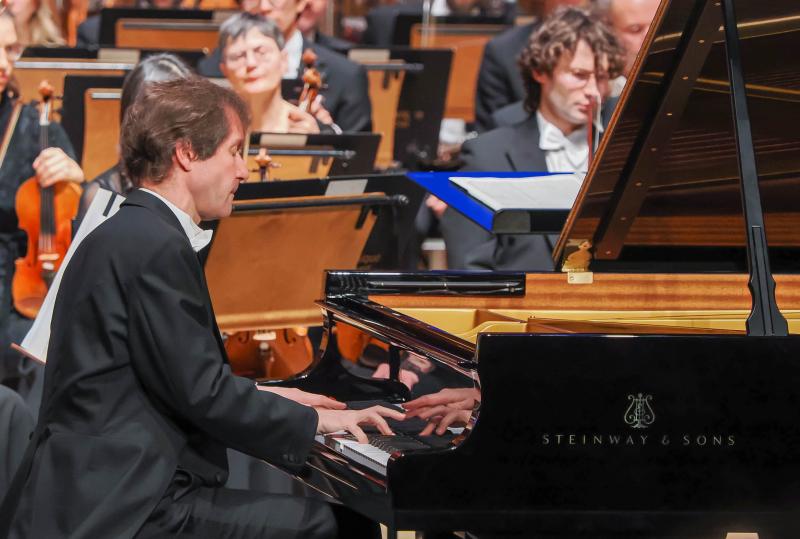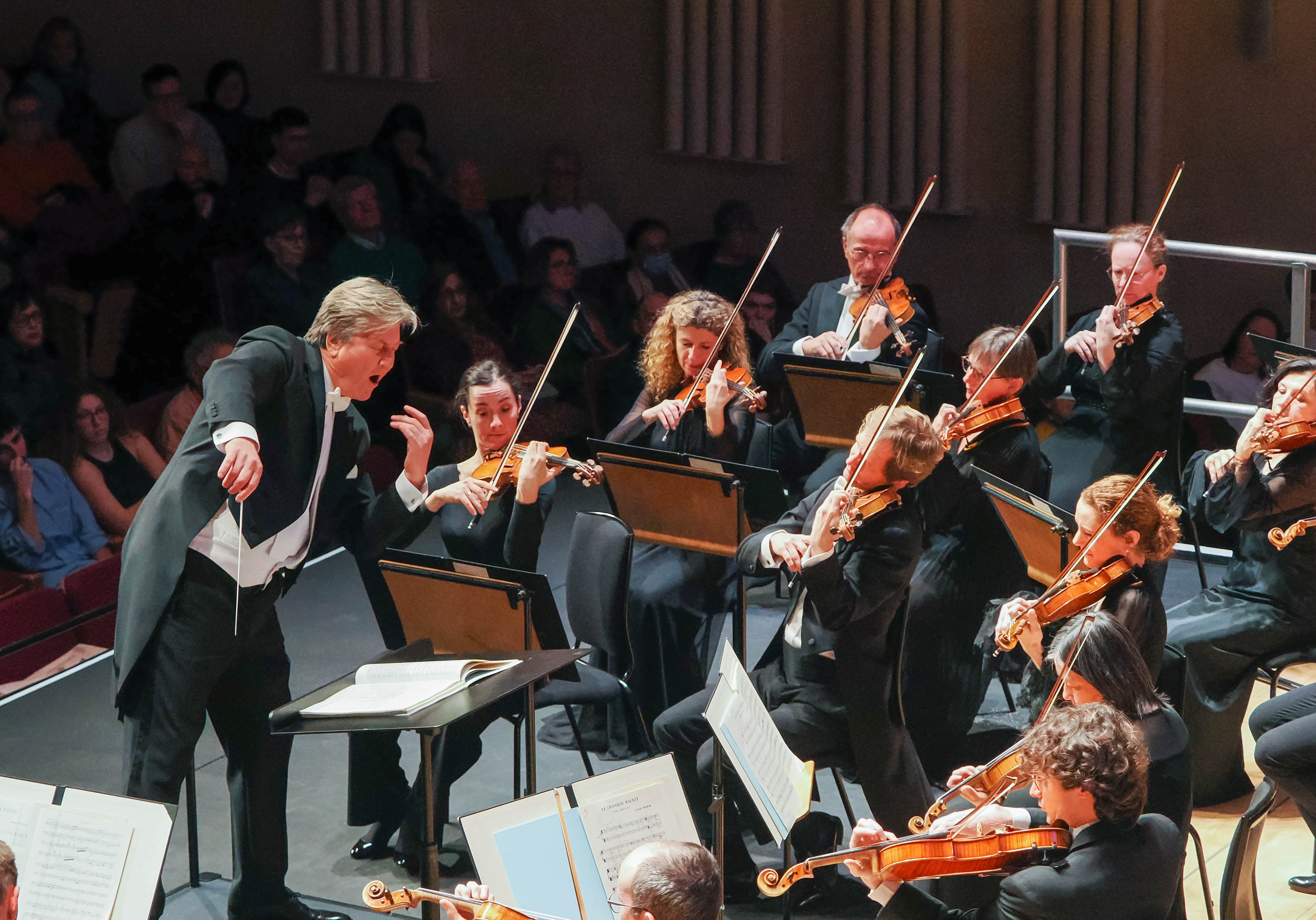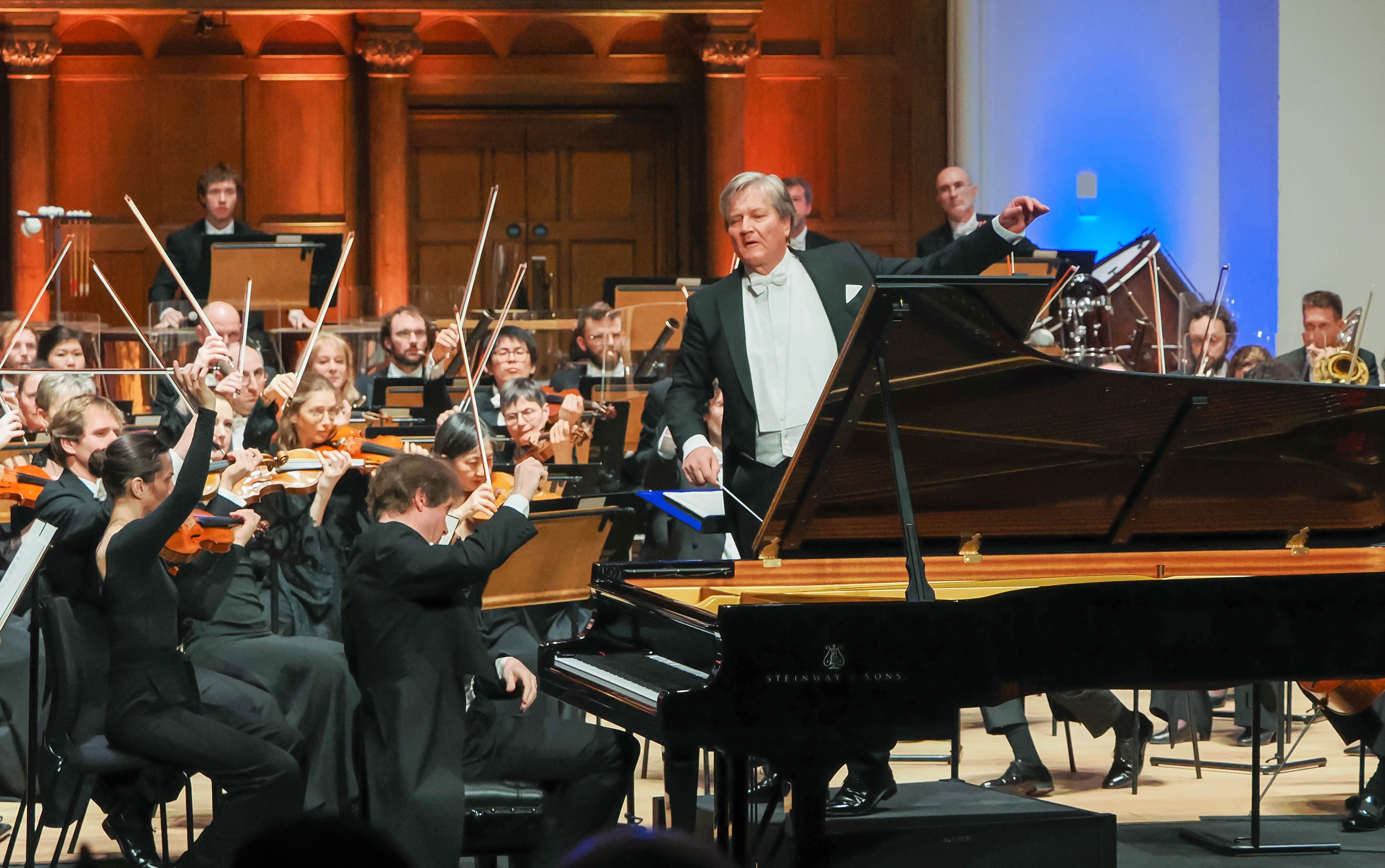Lugansky, Strasbourg Philharmonic Orchestra, Letonja, Cadogan Hall review - Russian soul, French flair | reviews, news & interviews
Lugansky, Strasbourg Philharmonic Orchestra, Letonja, Cadogan Hall review - Russian soul, French flair
Lugansky, Strasbourg Philharmonic Orchestra, Letonja, Cadogan Hall review - Russian soul, French flair
Masterful Rachmaninov flanked by Gallic treats

To judge by the post-interval empty seats near me, some of the Cadogan Hall audience had turned up last night solely to hear Nikolai Lugansky play Rachmaninov’s Second Piano Concerto. Well, the more fool them. For sure they would have enjoyed their not so-brief encounter with a truly distinguished Russian pianist – noble standard-bearer for a grand tradition – who gave a finely-polished, well-shaped rendition of this beloved old story (on the eve of Valentine’s Day, too).
Strasbourg, a city of around 290,000 people, supports this talent-rich outfit made up of 110 permanent musicians. Nottingham, with about 330,000 citizens, has recently proposed a 100 per cent cut to its municipal culture budget. Such are the fruits of 14 years of government-mandated austerity. Visitors such as the Strasbourgeois show us another way – which is one reason why post-Brexit officialdom tries to make such contacts as difficult as possible.
 Before Lugansky’s arrival, the Strasbourg Phil announced their intentions with a swaggering version of Berlioz’s Le carneval romain overture. One should of course on principle shun national stereotypes in relation to orchestras – including this one, with its cross-border Rhineland affinities, and many members drawn from much further afield. But Berlioz’s Roman merriment did come with an unmissably Gallic accent. A big band in a modestly-sized hall, Letonja’s forces delivered not just volume and impact (when required) but stylish individual voices, from perkily tender woods to crisp, deft brass. The saltarello dance had infectious verve and urgency, with Letonja (pictured above), here and in the later French pieces, keeping the tone bright and the ensemble tight.
Before Lugansky’s arrival, the Strasbourg Phil announced their intentions with a swaggering version of Berlioz’s Le carneval romain overture. One should of course on principle shun national stereotypes in relation to orchestras – including this one, with its cross-border Rhineland affinities, and many members drawn from much further afield. But Berlioz’s Roman merriment did come with an unmissably Gallic accent. A big band in a modestly-sized hall, Letonja’s forces delivered not just volume and impact (when required) but stylish individual voices, from perkily tender woods to crisp, deft brass. The saltarello dance had infectious verve and urgency, with Letonja (pictured above), here and in the later French pieces, keeping the tone bright and the ensemble tight.
Lugansky’s Rachmaninov could have brought with it a crashing shift of gears – but the orchestra-led unfolding of the concerto's Moderato first movement had poise and focus, rather than sheer declamatory force. As the piano came to the forefront of the piece, Lugansky’s legendary prowess and precision more than lived up to prior billing: his is an unshowy virtuosity that makes the most taxing passagework sound, not easy, but simply inevitable. I never found his rubato overdone, and in general he crafted a performance in which lucidity and even elegance took the upper hand over heart-on-sleeve emotionalism. We saw the clear stream of Rachmaninov’s underlying form, not just its raging torrent. Lugansky eschewed histrionic eccentricities; and even the fireworks felt subdued.
He knows how and when to take his time, from the opening bell chimes to the great uncoiling paragraphs of the Adagio sostenuto. Fine instrumental touches – clarinets, horns, cellos – helped to kindle this slow but never sluggish fire. A work renowned for its buffeting gusts of passion here glowed with a warm, calm intimacy. But when the leash did come off, in the Allegro scherzando, Letonja did hurl a few shattering thunderbolts. Even here, though, Lugansky (pictured below with Letonja) retained a certain cool astringency at times. This was no hyper-Romantic sugar rush but a precise, measured reading that made the piece, not just its eminent soloist, the star.
 The second half saw the Strasbourgeois set free with a selection box of French delights. César Franck’s Gothic tone-poem Le Chasseur maudit may have a touch of Disneyfied Wagner about it – what with its folkloric scene-painting as the wicked hunter breaks the Sabbath and rides straight to Hell – but Letonja and his players tackled it with rhythmic panache and meticulous decorative detail. The solo horn proved a particular joy. And the final frenzied gallop into perdition created a delicious entertaining, almost horror-movie, vibe.
The second half saw the Strasbourgeois set free with a selection box of French delights. César Franck’s Gothic tone-poem Le Chasseur maudit may have a touch of Disneyfied Wagner about it – what with its folkloric scene-painting as the wicked hunter breaks the Sabbath and rides straight to Hell – but Letonja and his players tackled it with rhythmic panache and meticulous decorative detail. The solo horn proved a particular joy. And the final frenzied gallop into perdition created a delicious entertaining, almost horror-movie, vibe.
Ravel’s suite Ma Mère L’Oye called for far subtler shades; Letonja and his band duly supplied them. From the gently “oriental” march of the “empress of the pagodas” to the sinuous waltz of Beauty and the Beast, its clarinet sparring with and against the bassoon, Ravel’s trip across his fairy-tale landscape unrolled with a springy, lilting step, right up to its climax in glorious ecstatic tutti.
The Strasbourgeois had cannily held a signature statement back for their closing flourish: Ravel’s La Valse, executed by Letonja with formidable rhythmic control and high-definition instrumental colour. Aching nostalgia and bitter scorn converge in this double-edged tribute to imperial Vienna (and old Europe as a whole) viewed across the corpse-strewn wilderness of the First World War. Letonja whirled, lurched and swung us from candlelit charm into abject, sickening terror. Swaying strings and punching brass relentlessly turned up the dial of sinister delirium. After which, we needed the respite of two contrasting miniatures to smooth our twisted nerves: Fauré’s serene “Sicilienne” from his Pelléas et Mélisande suite, and a jubilant “Farandole” from Bizet’s L‘Arlésienne. Far from the Rhine, maybe – but the Strasbourg Phil can evidently shine in every musical corner of the Hexagone.
rating
Explore topics
Share this article
Subscribe to theartsdesk.com
Thank you for continuing to read our work on theartsdesk.com. For unlimited access to every article in its entirety, including our archive of more than 15,000 pieces, we're asking for £5 per month or £40 per year. We feel it's a very good deal, and hope you do too.
To take a subscription now simply click here.
And if you're looking for that extra gift for a friend or family member, why not treat them to a theartsdesk.com gift subscription?
more Classical music
 Remembering conductor Andrew Davis (1944-2024)
Fellow conductors, singers, instrumentalists and administrators recall a true Mensch
Remembering conductor Andrew Davis (1944-2024)
Fellow conductors, singers, instrumentalists and administrators recall a true Mensch
 Hallé, Wong, Bridgewater Hall, Manchester review - meeting a musical communicator
Drama and emotional power from a new principal conductor
Hallé, Wong, Bridgewater Hall, Manchester review - meeting a musical communicator
Drama and emotional power from a new principal conductor
 Guildhall School Gold Medal 2024, Barbican review - quirky-wonderful programme ending in an award
Ginastera spolights the harp, Nino Rota the double bass in dazzling performances
Guildhall School Gold Medal 2024, Barbican review - quirky-wonderful programme ending in an award
Ginastera spolights the harp, Nino Rota the double bass in dazzling performances
 Queyras, Philharmonia, Suzuki, RFH review - Romantic journeys
Japan's Bach maestro flourishes in fresh fields
Queyras, Philharmonia, Suzuki, RFH review - Romantic journeys
Japan's Bach maestro flourishes in fresh fields
 Classical CDs: Swans, hamlets and bossa nova
A promising young pianist's debut disc, plus Finnish mythology and a trio of neglected British composers
Classical CDs: Swans, hamlets and bossa nova
A promising young pianist's debut disc, plus Finnish mythology and a trio of neglected British composers
 Christian Pierre La Marca, Yaman Okur, St Martin-in-The-Fields review - engagingly subversive pairing falls short
A collaboration between a cellist and a breakdancer doesn't achieve lift off
Christian Pierre La Marca, Yaman Okur, St Martin-in-The-Fields review - engagingly subversive pairing falls short
A collaboration between a cellist and a breakdancer doesn't achieve lift off
 Ridout, Włoszczowska, Crawford, Lai, Posner, Wigmore Hall review - electrifying teamwork
High-voltage Mozart and Schoenberg, blended Brahms, in a fascinating programme
Ridout, Włoszczowska, Crawford, Lai, Posner, Wigmore Hall review - electrifying teamwork
High-voltage Mozart and Schoenberg, blended Brahms, in a fascinating programme
 Sabine Devieilhe, Mathieu Pordoy, Wigmore Hall review - enchantment in Mozart and Strauss
Leading French soprano shines beyond diva excess
Sabine Devieilhe, Mathieu Pordoy, Wigmore Hall review - enchantment in Mozart and Strauss
Leading French soprano shines beyond diva excess
 Špaček, BBC Philharmonic, Bihlmaier, Bridgewater Hall, Manchester review - three flavours of Vienna
Close attention, careful balancing, flowing phrasing and clear contrast
Špaček, BBC Philharmonic, Bihlmaier, Bridgewater Hall, Manchester review - three flavours of Vienna
Close attention, careful balancing, flowing phrasing and clear contrast
 Watts, BBC Symphony Orchestra and Chorus, Bignamini, Barbican review - blazing French masterpieces
Poulenc’s Gloria and Berlioz’s 'Symphonie fantastique' on fire
Watts, BBC Symphony Orchestra and Chorus, Bignamini, Barbican review - blazing French masterpieces
Poulenc’s Gloria and Berlioz’s 'Symphonie fantastique' on fire
 Bell, Perahia, ASMF Chamber Ensemble, Wigmore Hall review - joy in teamwork
A great pianist re-emerges in Schumann, but Beamish and Mendelssohn take the palm
Bell, Perahia, ASMF Chamber Ensemble, Wigmore Hall review - joy in teamwork
A great pianist re-emerges in Schumann, but Beamish and Mendelssohn take the palm
 First Persons: composers Colin Alexander and Héloïse Werner on fantasy in guided improvisation
On five new works allowing an element of freedom in the performance
First Persons: composers Colin Alexander and Héloïse Werner on fantasy in guided improvisation
On five new works allowing an element of freedom in the performance

Add comment